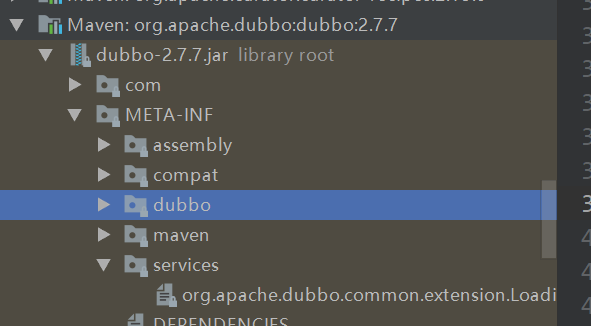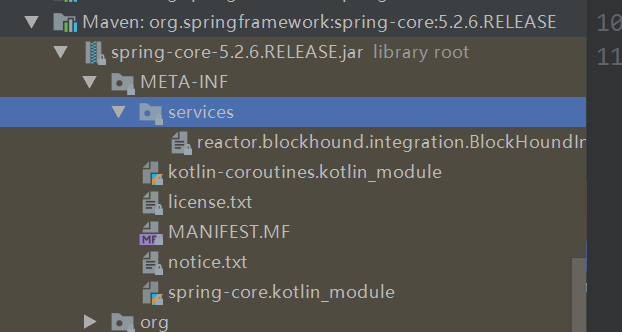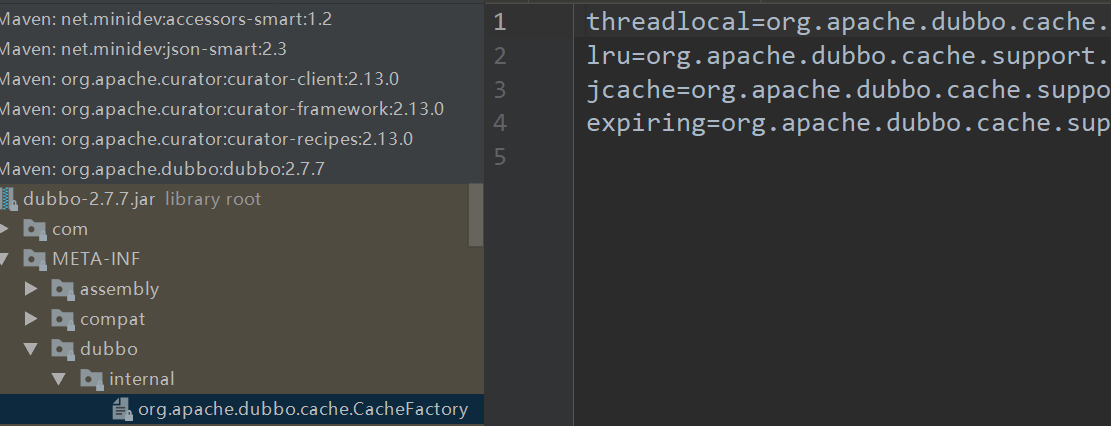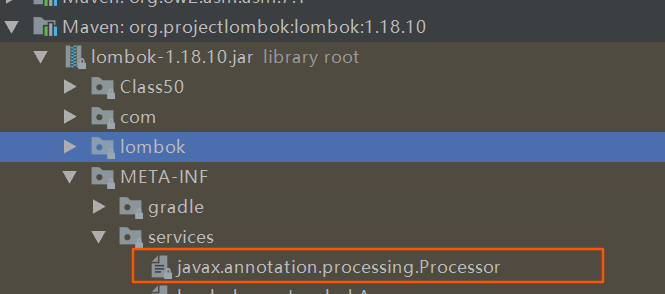事情的开始要从周一说起,那天晚上我正常编译打包准备更换部件,这时突然发现maven有个选项是debug maven compile,遂感到奇怪,这玩意有啥用??,唯一能想到的是编译时进行debug,但具体的应用场景不清楚,自从架构升级到中台之后,我们负责的模块再也没有控制器了,统一放到了网关部件,网关只依赖各个部件的"能力层",即只依赖接口,需要执行业务逻辑时需要解析各个部件的实现层提供的api文件,这个文件就是一个json数组,但是这玩意很烦,需要手动去配置,我通常是拷贝一个再去修改,但经常翻车,忘记把service或者method改掉,这时我突然想到编译时生成配置文件然后打包不就完事了吗?
1 {
2 "uri": "/api/test/ok",
3 "operation": "hello",
4 "description": "hello",
5 "service": "xxxx.service",
6 "method": "sayHello"
7 }
第一个想到的实现方式就是注解,但之前用的最多的注解类型是RUNTIME类型的,可以结合spring,反射+point实现注解逻辑,但编译时注解怎么操作?原理是javac编译的过程是一个独立的虚拟机进程,jdk提供了一个AbstractProcessor留给我们去继承重写相关方法(熟悉设计模式的估计已经想到模板模式了),达到编译时执行我们的注解处理器逻辑的目的.怎么做的问题解决了,可如何让虚拟机去加载我们的注解处理器呢?答案是SPI(service provider interfacse),如果你熟悉dubbo,或者spring,你会经常发现他们的jar包中的META-INF下面总是别有洞天,来两张图感受下


那到底啥是SPI,大白话就是第三方框架或者jsr相关规范定义好了接口,你直接来实现,并且告诉别人这个接口的实现类必须是我写的实现类,怎么操作呢?原始的java SPI网上一搜一堆,META-INF下新建services文件夹,新建文件名称为接口的全限定名,内容为实现类的全限定名,之后使用ServiceLoader进行加载,不过这玩意很烦,只要你写到这个文件类的实现都会被加载,所以dubbo做了优化,改成了键值对的方式,具体的可以看dubbo.internal下的实现

ok,把话说回来,SPI的作用就是XXInterface service = your impl,当你作为一个第三方框架的服务提供者,你就感受到这样做的好处了,后面会再写一篇文章详细介绍,等不及的可以先去看effective java,静态工厂方法那一块也有相关SPI讲解
照猫画虎,只要我们的注解处理器也这样操作就可以了,刚刚说到我们继承了AbstractProcessor, 那么我们的spi文件名就是他实现的接口全限定名了,内容是我们的注解处理器的全限定名了,so


如果你感觉这样麻烦采用guava提供的注解@AutoService即可,这个注解帮我们生成services下的文件,编码会贴在下面,不过在此之前要先说说怎么整合到我们的项目中?
首先给待整合的项目加入我们注解处理器项目的依赖,然后我们需要配置下maven的打包插件在编译时执行我们的注解处理器,在整合的过程中发现,由于使用了lombok,其自身也是借助编译处理器生成getter,setter代码所以我们也要让maven执行lombok的注解处理器,否则编译时各种找不到符号,可是lombok的注解处理器叫啥名?别着急,找到lombok的jar包然后去找META-INF下的services

看到了熟悉的文件名,查看内容就有了下面的注解处理器配置,问题解决,最后贴下配置和代码
1 <dependency>
2 <groupId>xxx</groupId>
3 <artifactId>api-build</artifactId>
4 <version>1.0-SNAPSHOT</version>
5 <scope>provided</scope>
6 </dependency>
7
8
9 <plugin>
10 <artifactId>maven-compiler-plugin</artifactId>
11 <version>3.3</version>
12 <configuration>
13 <source>1.8</source>
14 <target>1.8</target>
15 <encoding>UTF-8</encoding>
16 <annotationProcessors>
17 <annotationProcessor>lombok.launch.AnnotationProcessorHider$AnnotationProcessor</annotationProcessor>
18 <annotationProcessor>lombok.launch.AnnotationProcessorHider$ClaimingProcessor</annotationProcessor>
19 <annotationProcessor>你的注解处理器限定名称</annotationProcessor>
20 </annotationProcessors>
21 </configuration>
22 </plugin>
注解定义,注意是编译时注解RetenionPolicy.CLASS
1 @Documented
2 @Target(ElementType.METHOD)
3 @Retention(RetentionPolicy.CLASS)
4 public @interface ApiFunction
5 {
6
7 String uri() default "";
8
9 String operation() default "";
10
11 String description() default "";
12
13 /* String service() default "";
14
15 String method() default "";*/
16
17 String group() default "";
18
19 String version() default "";
20
21 String[] authorities() default {};
22
23 boolean needAuth() default true;
24
25 int priority() default 0;
26
27 }
注解处理器相关代码与依赖
1 <!--@AutoService-->
2 <dependency>
3 <groupId>com.google.auto.service</groupId>
4 <artifactId>auto-service</artifactId>
5 <version>1.0-rc6</version>
6 </dependency>
7
8 <!--注解处理器自身是个processor,所以编译时不可再去指定processor,否则循环调用自己,xx not found exception,gg-->
9 <plugin>
10 <artifactId>maven-compiler-plugin</artifactId>
11 <version>3.8.0</version>
12 <configuration>
13 <encoding>UTF-8</encoding>
14 <source>1.8</source>
15 <target>1.8</target>
16 <proc>none</proc>
17 </configuration>
18 </plugin>
1 /**
2 * @author tele
3 * @Description
4 * @create 2020-09-07
5 */
6 @AutoService(Processor.class)
7 public class ApiInfoGenerateProcessor extends AbstractProcessor
8 {
9 /**
10 * application.properties中的key,是否允许使用注解生成api-define.json
11 */
12 private static final String SWITCH = "api.auto-generate.enable";
13
14 /**
15 * 文件路径
16 */
17 private static final String API_PATH = "config/api-define.json";
18
19 /**
20 * 配置项路径
21 */
22 private static final String APPLICATION_PATH = "application.properties";
23
24 private static boolean enable;
25
26 private FileObject apiInfoFile;
27
28 @Override
29 public synchronized void init(ProcessingEnvironment processingEnv)
30 {
31 try
32 {
33 // 文件写入到编译后路径
34 apiInfoFile = processingEnv.getFiler().getResource(StandardLocation.CLASS_OUTPUT,"",API_PATH);
35 // 从源码位置读取配置开关
36 InputStream inputStream = processingEnv.getFiler().getResource(StandardLocation.CLASS_PATH, "", APPLICATION_PATH).openInputStream();
37 Properties properties = new Properties();
38 properties.load(inputStream);
39 enable = Boolean.valueOf(properties.getProperty(SWITCH));
// TODO close and check
40 }
41 catch (IOException e)
42 {
43 e.printStackTrace();
44 }
45 }
46
47 /**
48 * 指定支持的jdk版本
49 * @return
50 */
51 @Override
52 public SourceVersion getSupportedSourceVersion()
53 {
54 return SourceVersion.latestSupported();
55 }
56
57 /**
58 * 处理哪种类型的注解, * 表示处理所有类型的注解
59 * @return
60 */
61 @Override
62 public Set<String> getSupportedAnnotationTypes()
63 {
64 return Sets.newHashSet(ApiFunction.class.getCanonicalName());
65 }
66
67 /**
68 *
69 * @param annotations getSupportedAnnotationTypes返回的注解处理器集合
70 * @param roundEnv 获取扫描到的注解节点
71 * @return 当你有多个注解处理器时,返回true表示其他注解处理器不再对该类型的注解进行处理
72 */
73 @Override
74 public boolean process(Set<? extends TypeElement> annotations, RoundEnvironment roundEnv)
75 {
76 if(!annotations.isEmpty() && enable) {
77 Set<? extends Element> elementsAnnotatedWith = roundEnv.getElementsAnnotatedWith(ApiFunction.class);
78 List<String> apiInfoList = elementsAnnotatedWith.stream().filter(e -> e.getEnclosingElement().getKind().equals(ElementKind.CLASS)).map(e -> {
79 // service 获得父元素,注解加在方法上,父元素就是类或者接口了
80 TypeElement element = (TypeElement)e.getEnclosingElement();
81 // method
82 String methodName = String.valueOf(e.getSimpleName());
83 ApiFunction annotation = e.getAnnotation(ApiFunction.class);
84 Map<String, Object> map = new LinkedHashMap<>(8);
85 map.put("uri", annotation.uri());
86 map.put("operation", annotation.operation());
87 map.put("description", annotation.description());
88 map.put("service", String.valueOf(element.getQualifiedName()));
89 map.put("method", methodName);
90 if(annotation.group() != null && !"".equals(annotation.group())) {
91 map.put("group", annotation.group());
92 }
93 if(annotation.version() != null && !"".equals(annotation.version())) {
94 map.put("version", annotation.version());
95 }
96 if(annotation.authorities() != null && annotation.authorities().length != 0) {
97 map.put("authorities",Arrays.asList(annotation.authorities()));
98 }
99 // access 默认解析为true
100 if(!annotation.needAuth()) {
101 map.put("needAuth", annotation.needAuth());
102 }
103 if(annotation.priority() != 0) {
104 map.put("priority", annotation.priority());
105 }
106 return JSONUtil.toJson(map,true);
107 }).collect(Collectors.toList());
108 OutputStream outputStream = null;
109 try
110 {
111 File file = new File(apiInfoFile.toUri());
112 if(!file.exists()) {
113 file.getParentFile().mkdirs();
114 file.createNewFile();
115 }
116 System.out.println(String.format("find api:%d", apiInfoList.size()));
117 outputStream = new FileOutputStream(file);
118 IOUtils.write(String.valueOf(apiInfoList), outputStream, StandardCharsets.UTF_8);
119 outputStream.flush();
120 }
121 catch (IOException e)
122 {
123 e.printStackTrace();
124 }finally
125 {
126 try
127 {
128 IOUtils.close(outputStream);
129 }
130 catch (IOException e)
131 {
132 e.printStackTrace();
133 }
134 }
135 }
136 return true;
137 }
138 }
说回开头,maven的debug问题,当你在依赖注解处理器的项目上执行debug maven compile时,只要给注解处理器代码打断点就ok了更复杂的注解处理器应用可以参考https://juejin.im/post/6844903879524483086,也可以参考<<深入理解java虚拟机>>第十章关的插入式注解处理器相关内容